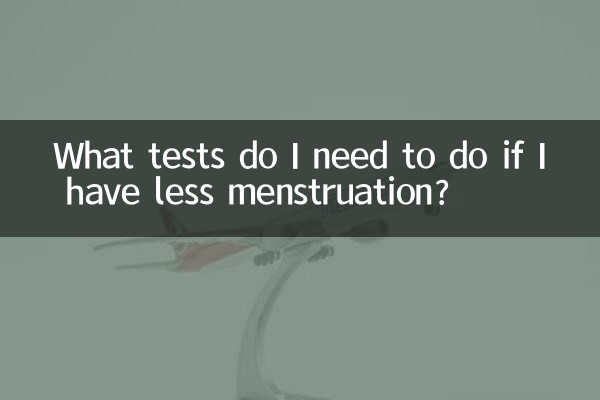What tests do I need to do if I have less menstruation?
In recent years, women's health issues have attracted much attention, especially menstrual abnormalities. Oligoperiod (low menstrual flow) may be a signal from your body that further examination is needed. This article will combine the hot topics and hot content on the Internet in the past 10 days to provide you with a detailed analysis of the check-up items that need to be done when menstruation is low, and provide structured data for reference.
1. Possible reasons for less menstruation

Infrequent menstrual periods may be related to a variety of factors, including endocrine disorders, reduced ovarian function, uterine lesions, malnutrition, excessive stress, etc. The following are related topics that have been hotly discussed on the Internet in the past 10 days:
| hot topics | Discussion popularity |
|---|---|
| The relationship between endocrine disorders and low menstrual flow | high |
| Symptoms of polycystic ovary syndrome (PCOS) | high |
| The impact of stress on menstruation | middle |
| Malnutrition and menstrual abnormalities | middle |
2. Check-up items that need to be done if the period is short
If your menstrual flow continues to decrease, it is recommended to seek medical advice promptly and undergo the following examinations:
| Check items | Inspection purpose | Things to note |
|---|---|---|
| Six hormone tests | Assess endocrine function and check estrogen, progesterone, etc. levels | It is recommended to check on the 2nd to 3rd day of menstruation |
| B-ultrasound examination | Observe the structure of the uterus and ovaries, and detect uterine fibroids, ovarian cysts, etc. | Transvaginal B-ultrasound is clearer |
| Thyroid function test | Investigate the impact of thyroid dysfunction on menstruation | Need to draw blood on an empty stomach |
| hysteroscopy | Directly observe the condition of the uterine cavity and diagnose uterine adhesions and other lesions | It needs to be done 3-7 days after menstruation is clean |
| AMH examination | Assessing ovarian reserve | Can be checked at any time |
3. Hot topics about menstrual examination in the past 10 days
According to network-wide data monitoring, the following content has been widely discussed in the past 10 days:
| Hot content | Attention |
|---|---|
| The importance of AMH examination | extremely high |
| How to interpret the six hormone reports | high |
| Precautions for hysteroscopy | middle |
| The relationship between thyroid function and menstruation | middle |
4. Things to note in daily life
In addition to medical examinations, it is also important to adjust your lifestyle:
1.Keep a regular schedule:Get enough sleep and avoid staying up late.
2.A balanced diet:Eat more foods rich in iron and protein, such as lean meat, animal liver, etc.
3.Moderate exercise:Choose gentle exercise such as yoga and walking to avoid overly strenuous exercise.
4.Psychological adjustment:Learn to reduce stress and stay happy.
5. When you need immediate medical attention
It is recommended to seek medical attention immediately if:
1. Menstrual flow suddenly decreases significantly and lasts for more than 3 months.
2. Accompanied by severe dysmenorrhea or other uncomfortable symptoms.
3. Need to prepare for pregnancy but have abnormal menstruation.
4. Menopausal symptoms such as hot flashes and night sweats occur.
In short, less menstruation may be a warning signal sent by the body. Through systematic examination, the cause can be clarified and timely intervention and treatment can be provided. We hope that the structured data and hot content provided in this article can help you better understand related examination items and maintain women's health.

check the details

check the details